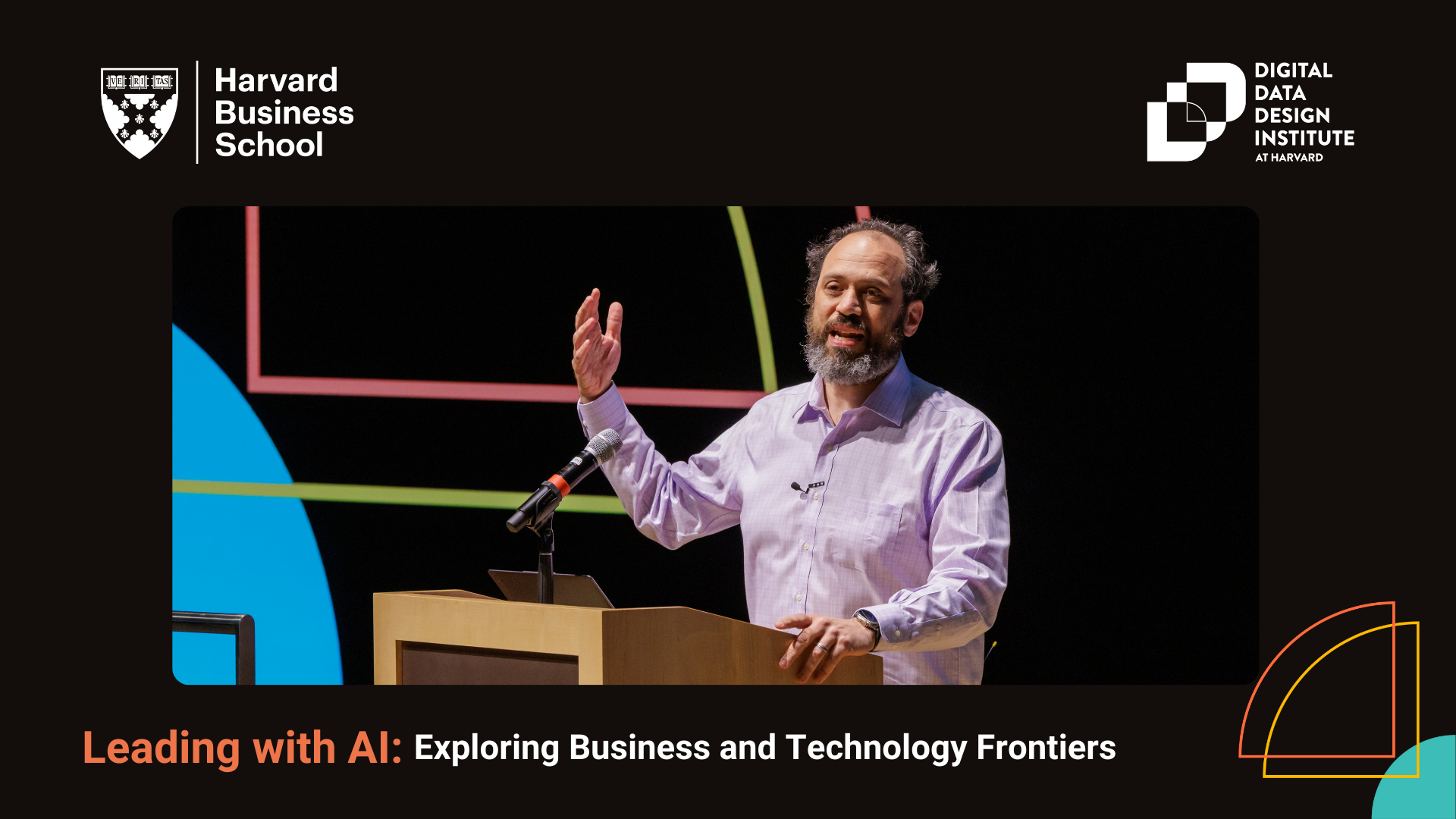On May 7, the Digital Data Design Institute at Harvard hosted Leading with AI: Exploring Business and Technology Frontiers. A key speaker at the conference was Ethan Mollick, an Associate Professor at the Wharton School of the University of Pennsylvania. Mollick spoke about AI’s disruptive impact on work and business, its rapid advancements, and how it can perform various tasks from launching products to analyzing data. Mollick urged organizations to rethink their strategies, emphasizing the importance of human agency in shaping AI’s future applications.
Key Insight: Demonstrating AI’s Capabilities
“This idea of delegating out work, I think is really interesting, not just because it is an interesting system, but also because it fundamentally changes how we relate to these AI systems…but AI with work is much easier if you’re delegating it to like a person and it just does the work for you quietly while you do other things.”
To illustrate the transformative potential of AI, Mollick conducted live demonstrations during the session. He showcased how AI could generate comprehensive marketing campaigns, websites, and educational materials within minutes. For example, he used AI to create a full email marketing campaign, develop a website, and produce a social media strategy in just minutes. These demonstrations underscored AI’s ability to handle complex tasks traditionally requiring human expertise, thus freeing up valuable time for professionals to focus on more strategic activities.
Key Insight: Adapting to AI Advancements
“So I think organizations need to be thinking about this as fundamental change, as not just an incremental change, as not something slow. I’m trying to show you stuff is happening right now…because no one’s figuring it out for you and we’re in a really interesting moment of acceleration.”
Mollick emphasized the need for businesses to adapt to the rapid advancements in AI technology. He urged organizations to identify skills that are becoming redundant due to AI and to explore new opportunities that AI enables. This involves a strategic shift in thinking about how work is divided between humans and machines. Businesses must now categorize tasks into three types: human-only, AI-assisted, and fully automated. This approach allows organizations to leverage AI where it excels while preserving human oversight and creativity in areas where it is most valuable.
Key Insight: Ethical and Practical Considerations
“But the most important thing I would say for all your organizations in the room is thinking about AI like an IT problem is a mistake, because the AI is super bad software, right?…But it works really well like people. It’s not a person, it’s very important to realize it isn’t, but it works like a person. And as a result, being good with AI is often about being good with people.”
The integration of AI into the workforce brings with it a host of ethical and practical considerations. Mollick stressed the importance of understanding both the strengths and limitations of AI. For example, while AI can generate high-quality content and handle complex analyses, it can also make errors and lacks the nuanced understanding of human context. Therefore, a balanced approach that combines human creativity and oversight with AI’s efficiency is crucial. This balance ensures that AI enhances rather than diminishes the quality of work and human well-being.
Key Insight: Shaping the Future of AI
“Again, we have to think about how we’re going to work with systems where this is the case…it does suggest some urgency in thinking about how do we fit humans and machines together in a world where this stuff is evolving?”
One important takeaway from the session was the urgent need for businesses and individuals to actively shape the future of AI. Mollick highlighted that AI should be used to enhance human thriving rather than to track or surveil. He encouraged organizations to think beyond incremental changes and to consider how AI can help achieve seemingly impossible goals. For instance, AI can democratize access to high-quality consulting services, making them available to a broader range of businesses, or create personalized customer service experiences that far exceed current standards.
Key Insight: Practical Examples and Case Studies
“I think the mission for us is to have agency and figure out what we want to do with AI. How do we push it forward? How do we use it to help humans thrive rather than to track them or watch them or surveil them, and that’s not a choice being made by the AI companies, that’s a choice we get to make…and I hope that we take that agency and start to shape a future where this is built for human thriving and not the downsides that we see in front of us as well.”
Mollick shared several practical examples and case studies to illustrate the real-world impact of AI. In one instance, he described how AI tools were used to improve the quality and efficiency of consulting tasks at BCG, resulting in performance improvements akin to those seen during the Industrial Revolution. Another example involved a study of University of Minnesota law students, where AI assistance significantly improved students’ performance, effectively eliminating the bottom half of the grade distribution. These case studies provide compelling evidence of AI’s potential to level the playing field and drive significant productivity gains across various professions.
Mollick concluded by asking four questions organizations should think about related to AI:
- What useful thing do you do now that is no longer valuable?
- What impossible thing can you do now?
- What can you move downmarket or democratize?
- What can you move upmarket or personalize?
Meet the Speaker

Ethan Mollick is an Associate Professor at the Wharton School of the University of Pennsylvania, where he studies and teaches innovation and entrepreneurship, and examines the effects of artificial intelligence on work and education. His papers have been published in top journals and his book on AI, Co-Intelligence, is a New York Times bestseller.
Ethan is the Co-Director of the Generative AI Lab at Wharton, which builds prototypes and conducts research to discover how AI can help humans thrive while mitigating risks. Mollick received his PhD and MBA from MIT’s Sloan School of Management and his bachelor’s degree from Harvard University.
Additional Resources
- Co-Intelligence: Living and Working with AI
- Co-Intelligence: Wharton Prof. Ethan Mollick on Collaboration Between Humans & AI | Technovation 860 – A discussion of “Co-Intelligence: Living and Working with AI” and the conversation around the interplay between humans and artificial intelligence. (YouTube)
- Ethan Mollick Substack
